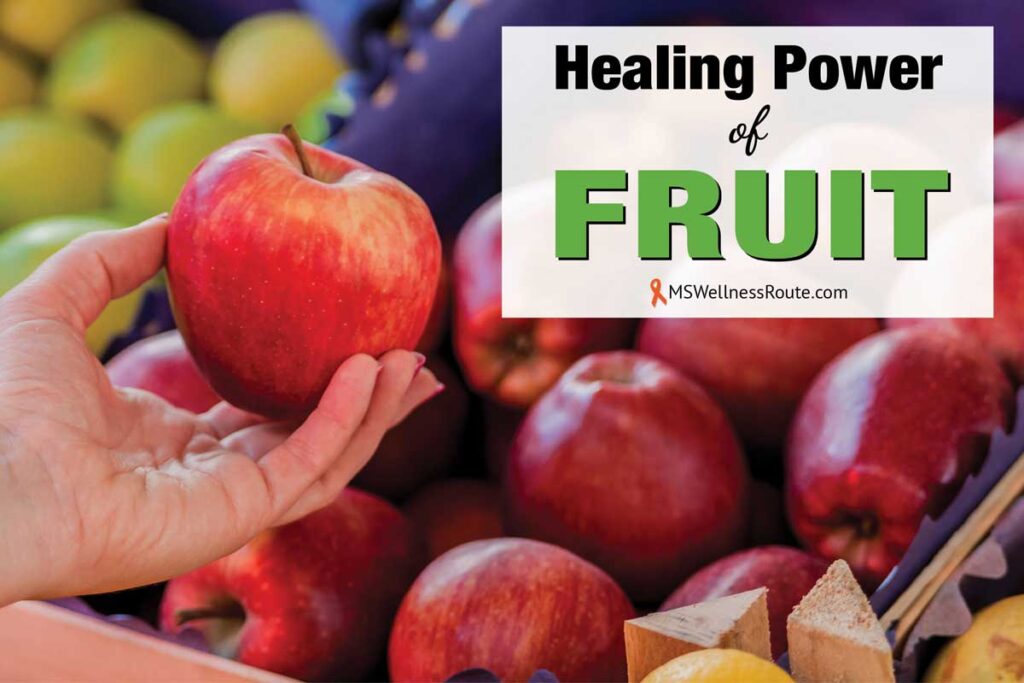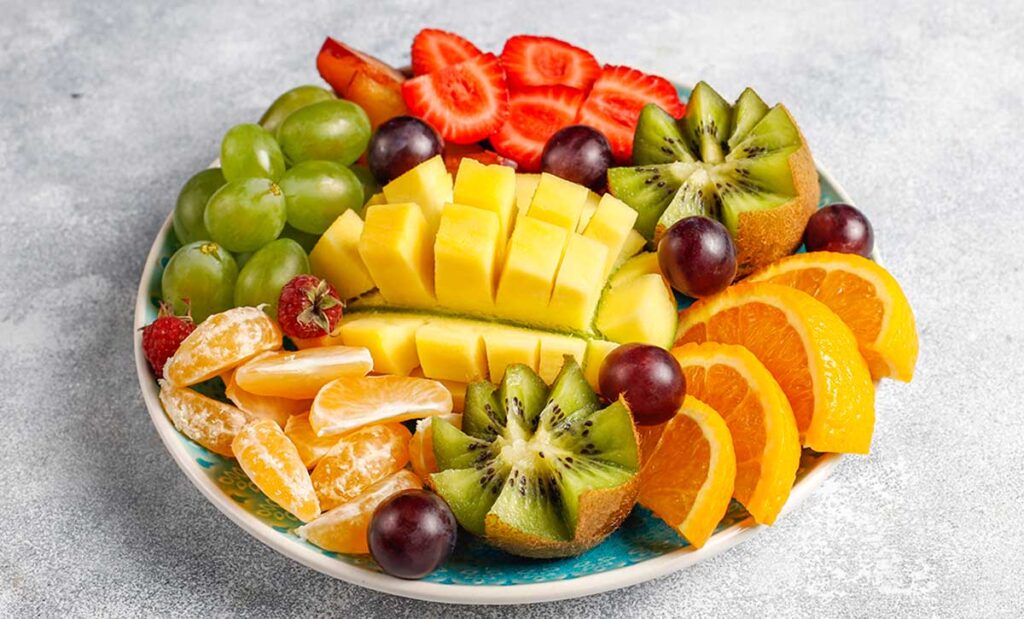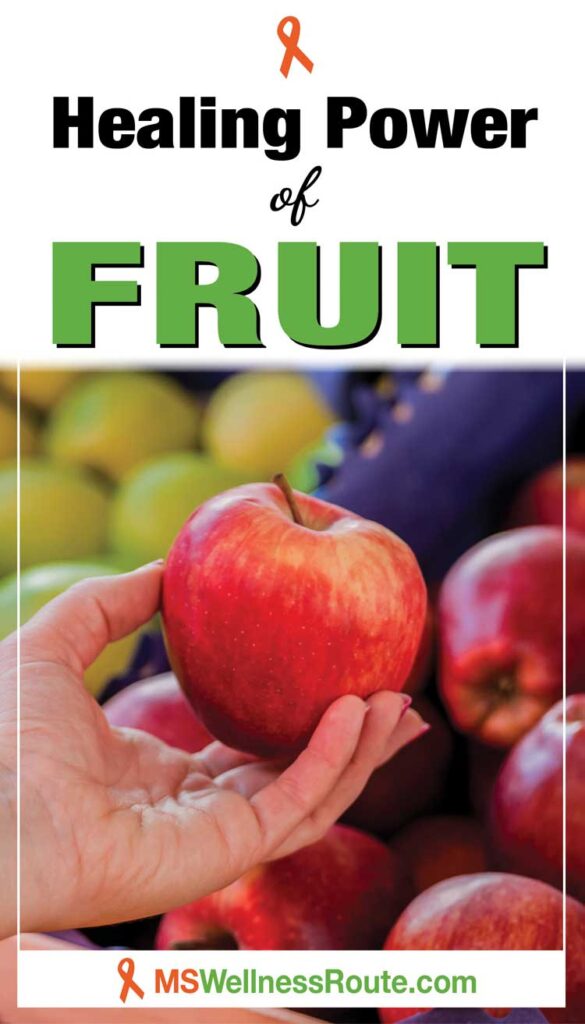Last Updated on November 13, 2023 by Cathy

Multiple sclerosis (MS) is a chronic inflammatory disease. Symptoms include neurological damage such as numbness, fatigue, and weakness. The main cause of MS is due to environmental toxins.
Escaping all environmental toxins is impossible. The best you can do is to reduce the amount of toxins in your home. You can also eat more fruits and vegetables which help lower chronic inflammation.
I’ve been living with MS for most of my life. I didn’t always eat healthy. It wasn’t until after I had a horrible MS flare that made me change. I started managing my MS naturally in 2005 without MS medications.
Benefits of Fruit

Image by azerbaijan_stockers on Freepik
Fruits are highly beneficial for your overall health. They are rich in nutrients that help fight off environmental toxins. All fruits have anti-inflammatory properties which helps lower chronic inflammation. They are rich in antioxidants, phytochemicals, and fiber.
Dr. Terry Wahls, the author of The Wahls Protocol, recommends people eat 9 cups of vegetables each day. There are three levels, one being the least strict and three being the most. She mostly emphasizes vegetables and not fruit.
Dr. Wahls recommends eating 3 cups of each daily:
- Leafy greens
- Colorful vegetables
- Cruciferous vegetables such as asparagus, broccoli, and cabbage
However, level three is a ketogenic diet, which is very low in carbohydrates. Because of the natural sugar in fruit, she recommends limiting fruit to one serving per day, preferably berries.
Fear of Fruit

Image by KamranAydinov on Freepik
For years, I was taught to avoid most fruits due to their sugar content. Then I did some research and discovered fruit doesn’t spike blood sugar. Now, fruit is back in my diet.
“Greater consumption of specific whole fruits, particularly blueberries, grapes, and apples, was significantly associated with a lower risk of type 2 diabetes, whereas greater fruit juice consumption was associated with a higher risk.” – PubMed
Here are several ways fruit contributes to healing and supporting your body:
- Anti-inflammatory effects. Chronic inflammation is the cause of MS. It also includes heart disease, diabetes, and certain types of cancer. Fruit contains anti-inflammatory compounds to promote healing.
- Antioxidant properties. Fruit contains antioxidants that help combat oxidative stress caused by free radicals. Oxidative stress plays a major role in MS. Antioxidants neutralize free radicals, reducing the risk of MS, heart disease, and cancer.
- Disease prevention. They taught me to avoid most fruits due to their sugar content for years. This includes heart disease, stroke, certain cancers, and age-related macular degeneration. These foods promote optimal health and protect against various conditions.
- Fiber content. Most fruits are excellent sources of dietary fiber. Fiber is crucial for gut health, promoting regular bowel movements, and preventing constipation. Constipation is common for people with MS. It also helps control blood sugar levels, lower cholesterol levels, and manage weight.
- Hydration and electrolyte balance. Many fruits have high water content to help keep you hydrated. Proper hydration is essential for various bodily functions. These include circulation, temperature regulation, and nutrient transport. Plus, certain fruits such as bananas are good sources of electrolytes like potassium. Potassium plays a crucial role in supporting nerve and muscle function.
- Nutrient density. Fruit packs essential vitamins, minerals, antioxidants, and phytochemicals, offering nutrient density. These nutrients support immune function, cell repair, and overall tissue health.
It’s important to consume a variety of fruits to obtain a wide range of nutrients. Eating fruit promotes healing and supports your immune system.
Importance of Antioxidants

Image by dashu83 on Freepik
Antioxidants protect cells from free radical damage. Free radicals cause oxidative stress, leading to cellular damage. Here’s how antioxidants can benefit you:
- Anti-inflammatory effects
- Enhancing skin health
- Neutralizing free radicals
- Promoting healthy aging
- Protecting against chronic diseases
- Supporting the immune system
Eat a variety of fruit to get the most nutrients. Include fruit such as berries, citrus fruits, mango, and papaya.
Fruits with a high antioxidant content include:
- Berries. Berries have high antioxidant properties. They are rich in anthocyanins, a type of antioxidant that gives them their vibrant colors. Cherries and goji berries are also rich in antioxidants.
- Citrus fruits. Citrus fruits are excellent sources of vitamin C, a potent antioxidant. They also contain other antioxidants such as flavonoids and limonoids.
- Tomatoes. Tomatoes are a great source of the antioxidant lycopene, which gives them their red color. Lycopene reduces the risk of certain cancers and offers various health benefits.
- Red grapes. Red grapes, especially dark varieties contain heart-healthy resveratrol and other antioxidants.
- Pomegranates. Pomegranates are high in antioxidants and have anti-inflammatory effects.
Wild Blueberries

Image by YuliiaKa on Freepik
Wild blueberries have higher antioxidant levels compared to cultivated blueberries. If you can’t find wild blueberries, cultivated blueberries are still good. Make sure they are organic blueberries.
You can find frozen wild blueberries in the freezer section of many grocery stores. If you can’t find any Amazon sells dried, syrup, and powdered blueberries.
Read more about wild blueberries here: Power Up Against MS With Wild Blueberries
Pathogens and Fruit
In 2022, a study came out stating Epstein-Barr virus (EBV) is the main cause of MS. Fruit alone doesn’t remove pathogens from the body. However, they do support the overall functioning of the immune system. This, in turn, plays a crucial role in fighting off pathogens like viruses.
Here’s how fruit contributes to immune health and indirectly helps combat pathogens:
- Antioxidant protection
- Fiber and gut health
- Hydration and overall health
- Nutrient support
Best Fruit for the Nervous System

It’s best to eat a wide variety of fruits for overall health. However, some have neuroprotective properties that benefit people with MS such as:
- Apples
- Avocados
- Bananas
- Berries, especially wild blueberries
- Cherries
- Citrus fruits
- Peaches
- Plums
- Olives
- Tomatoes
- Watermelon, the black seeds help the nervous system
Healing Power of Fruit

Image by svetlanasokolova on Freepik
Fruit reduces chronic inflammation. Fruit’s high content of antioxidants, phytochemicals, and fiber helps reduce chronic inflammation. It promotes a healthy gut microbiome by neutralizing free radicals and regulating immunity. To speed up your healing process eat more fruits, leafy greens, and vegetables. Include a variety of herbs such as basil, cinnamon, garlic, oregano, and turmeric. Also, drink plenty of water, get enough sleep, exercise, and reduce your stress.
Experience the healing power of fruit. They are packed with essential nutrients, antioxidants, and fiber, fruit is nature’s gift for optimal health. From vibrant berries to refreshing citrus, each bite delivers a burst of goodness that nourishes your body and supports overall well-being.
The natural sugars in fruit provide energy while the fiber aids digestion and helps maintain a healthy weight. Meanwhile, the antioxidants protect against cellular damage, reducing the risk of chronic diseases.
Unlock the potential of fruit and embrace its healing power for a vibrant and nourished life.

Free Wellness Library!
Subscribe for free and I’ll send you the password to my secret library filled with many printables for your wellness journey.
Want to remember this health tip? Pin it to your Pinterest board!

Image by Dragana_Gordic on Freepik
Resources:
https://pubmed.ncbi.nlm.nih.gov/26626971/
Healing Power of Fruit





